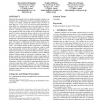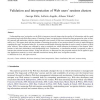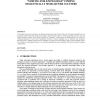178 search results - page 13 / 36 » Clustering web search results using fuzzy ants |
ERCIMDL
1999
Springer
13 years 12 months ago
1999
Springer
I show that the World Wide Web is a small world, in the sense that sites are highly clustered yet the path length between them is small. I also demonstrate the advantages of a sear...
ICMCS
2006
IEEE
14 years 1 months ago
2006
IEEE
Although relevance feedback has been extensively studied in content-based image retrieval in the academic area, no commercial web image search engine has employed the idea. There ...
WSDM
2009
ACM
14 years 2 months ago
2009
ACM
Measuring the similarity between implicit semantic relations is an important task in information retrieval and natural language processing. For example, consider the situation whe...
IPM
2007
13 years 7 months ago
2007
Understanding users’ navigation on the Web is important towards improving the quality of information and the speed of accessing large-scale Web data sources. Clustering of users...
IADIS
2004
13 years 9 months ago
2004
In this paper we present our technique for finding semantically similar clusters within web documents obtained from a set of queries retrieved from the Google search engine. This ...



